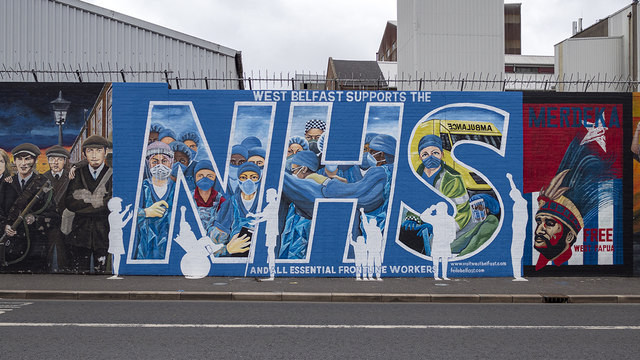The NHS’ humanitarian nature has made it intensely popular among all working class communities, but its very establishment threatened the cross-class alliance that made Northern Ireland’s existence possible, writes Paddy Wilson.
A banner spans a street from lamppost to lamppost in loyalist stronghold Sandy Row. The background has a rainbow of colours. Between the logos of the South Belfast Protestant Boys band and a Rangers Supporters Club, the banner proclaims “WE LOVE OUR NHS” – “NO SURRENDER TO COVID-19”.
In the west of the same city, a flag of the NHS logo flies prominently beside a tricolour and Palestinian flag. Another banner reads: “CUMANN NA MEIRLEACH POBLACHTACH EIREANNACH – THE FELONS CLUB. SUPPORT OUR NHS AND ALL KEY WORKERS”.
There are few things that can really bring the entire population of the North together. But in the midst of the Coronavirus pandemic, a crisis that has infected millions around the world, the finest of these things has come to the fore. The National Health Service, or as it is currently known here, Health and Social Care. The HSC.
Today, there is almost universal support for the HSC, regardless of one’s position on the national question. However, while unionists like to laud the HSC as a great British institution, its very establishment threatened the cross-class alliance that made it possible for NI to exist.
The history of not just the HSC, but the entire welfare state in Northern Ireland is one that was entirely in the control of a single political party, that of the ‘Official’ Unionist Party, later the UUP. From the partition of Ireland in 1921 until the collapse of the Stormont Parliament in 1972, the rule of the jurisdiction was entirely under the control of this one party. 50 years of unbroken rule. While this sort of political hegemony allowed for the disregard of the concerns of the Nationalist minority, it could not have existed without a cross-class aspect to Unionism.
Some ‘Big-house’ unionists were smart enough to know and exploit this. Others were unable to see that risking discontent amongst the loyalist working class could also put their constitutional aspirations at risk. For some, the desire to create an economic, lassiez-faire economy would be worth more than the Union they had fought so hard to maintain. The idea of Dominion status floated within the UUP when ‘socialist’ ideas started to emanate from a Labour government in London.
Even before the state was created, the support of the working class was recognised as being vital to Unionism. The Representation of the People Act 1918 had removed the property requirement for voting and extended the franchise to all men over 21 and women over 30, regardless of class. The significance of this was not lost on the Ulster Unionist Council of the time. They knew that the working class would now form the largest voting bloc and that they would need, at least, to pay lip service to working class needs.
Edward Carson spoke of the general unrest across the world following the First World War, referencing such events as the October Revolution and the Battle of George Square in Glasgow in 1919.
The Orange Order focused on recruitment of demobilised soldiers and the Ulster Unionist Labour Association was established to smooth relations between Trade Unionists, the Ulster Unionist Council and industry. The UULA would be headed by John Miller Andrews, a landowner and industrialist. In a letter to Carson, Dawson Bates stated that the UULA would be a means of distracting younger members of the working class away from the emerging Independent Labour movement.
Throughout the history of the NI Parliament, the spectre of Labour politics always spooked Unionism. In 1919, a strike by mostly Unionist engineers was condemned as ‘Bolshevik’ and disloyal.
One of the first issues that the Northern Ireland government had to tackle was the limited means of raising revenue that were available to it. Most taxation was reserved by Westminster. Furthermore, Stormont was expected to pay an ‘Imperial Contribution’ to the Treasury in London, to account for the defence costs of NI.
This fiscal arrangement proved unstable for the new NI government and the first cabinet would be divided on the issue.
Hugh Pollock, the Minister of Finance, wished to pursue a line of lassiez-faire liberalism. If possible, he hoped to negotiate a reduction in the IC payment, but felt it was important to pay what was demanded, no matter how much it would impact on spending in NI. He viewed it as vital that NI was seen to be able to stand on its own, in something of a federal relationship with London.
Andrews, who was appointed the first Minister of Labour, viewed things differently. Having been tasked with placating Unionist workers within the UULA, he was slightly more aware of what workers’ demands might be.
The core of his argument asked why would Working Class unionists view any real value in defending the union with Britain if the social securities in NI were not equivalent to social securities in Britain. NI already lagged behind Britain in terms of housing, health and education generally. If the minimal state spending that was being proposed by Pollock was to go ahead, it was very plausible that NI would fall further behind, and the ruling party, accordingly, would lose the support of WC unionists.
Andrews’ argument won out in the end. The end goal of the continued union with Britain was deemed too important to cede even the smallest section of the loyalist working class to a burgeoning Labour movement.
From the 1920s onwards, the quality of NI’s social security would be comparable to that in Britain, despite Stormont’s frequent need for subsidy from Westminster.
These inherent class contradictions within unionism would continue to surface throughout the existence of the NI Parliament. During the Second World War, there was substantial industrial unrest and strike action was not uncommon. This was particularly concerning for Stormont given Belfast’s key role in warship, aircraft and munition manufacture.
Following the war, the British election saw a Labour government take power and begin to construct the Welfare State. In the North of Ireland, there was also a swing towards the left, albeit on a smaller scale than elsewhere. A collection of NI Labour, Commonwealth Labour and independent, working-class unionist candidates managed, with others, to cost the UUP six seats. While they still had a comfortable majority in the NI House of Commons, this upset was enough to spur the Big House unionists into action and make concessions to the working class.
In the three years following 1945, the UUP government would enact measures on National Insurance, public housing and, importantly, public health. This was going against the wishes of many of the middle-class membership of the UUP, with Prime Minister Brooke speaking of ‘extreme socialistic measures’.
Despite this supposed opposition to the Welfare State, the fact remains that the UUP established it. There was a strong ‘realpolitik’ within Unionism at the time. They knew that the othering of Catholics and Nationalists would not be sufficient to maintain power in NI. They would have to count on the support of a section of the working class in order to shore themselves up.
First, stoked sectarianism was utilised to divide worker from worker. Then, Westminster was required to subsidise social protections in order to placate the loyalist working class.
Of course, the UUP would use those social protections in a sectarian fashion. Housing. in particular, was frequently denied to Catholics by Unionist-dominated councils. (NICRA would ultimately win allocation of housing by need through the Housing Executive.)
Importantly, NI had a health service that was free at the point of service.
Throughout the conflict and through this present pandemic, there is an organisation of men and women that is committed to the preservation of life and health regardless of colour, gender or creed. This very humanitarian nature of the HSC has caused it to become intensely popular among all working class communities, regardless of the political chicanery that was involved in its establishment.





